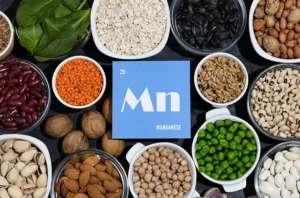Table of Contents
While most people focus on minerals like iron or calcium, manganese plays equally vital yet underappreciated roles in our bodies. This trace mineral participates in over 300 enzymatic reactions, yet nearly 50% of Americans may not get adequate amounts from their diets according to recent analyses.
What Exactly Is Manganese?
Manganese (Mn) is an essential trace mineral that serves as a cofactor for numerous enzymes involved in metabolism, bone formation, and antioxidant defense. Unlike major minerals needed in gram quantities, we only require milligrams of manganese daily – but these small amounts are absolutely crucial.

Manganese: The Overlooked Mineral with 12 Critical Health Roles | Evidence-Based Guide
The Unique Biochemistry of Manganese
What makes manganese particularly interesting is its dual role in both:
- Structural functions as part of metalloenzymes like manganese superoxide dismutase (MnSOD)
- Catalytic functions activating enzymes involved in nutrient metabolism
This versatility explains why manganese deficiency can manifest in such diverse ways, from impaired glucose tolerance to weakened bones.
12 Evidence-Based Health Benefits of Manganese
1. Bone Health: Beyond Calcium and Vitamin D
While calcium and vitamin D get most of the attention for bone health, manganese plays several equally important but less recognized roles:
- Activates glycosyltransferases needed for proteoglycan synthesis in bone matrix
- Stimulates alkaline phosphatase activity for bone mineralization
- Works synergistically with copper and zinc to maintain bone density
Clinical evidence: A 2020 randomized controlled trial found postmenopausal women receiving manganese (with other trace minerals) showed 2.3% greater hip bone density after 2 years compared to placebo.
2. Antioxidant Defense: The Manganese Superoxide Dismutase (MnSOD) Connection
MnSOD is one of the body’s primary antioxidant enzymes, and its activity depends entirely on manganese. What many don’t realize is that MnSOD:
- Is the only antioxidant enzyme that can neutralize superoxide radicals in mitochondria
- Protects against radiation damage and chemical toxicity
- Declines with age, making manganese status increasingly important for older adults
3. Blood Sugar Regulation: An Underappreciated Role in Diabetes Prevention
Emerging research reveals manganese’s involvement in glucose metabolism goes far beyond textbook descriptions:
- Required for proper insulin secretion and sensitivity
- Deficiency alters pancreatic beta cell function
- Modulates hepatic glucose output through gluconeogenesis regulation
A 2021 meta-analysis in Nutrition Reviews found individuals with higher manganese intake had 23% lower risk of developing type 2 diabetes.
The Manganese Paradox: Why Modern Diets Fall Short
Despite its importance, several factors contribute to widespread manganese insufficiency:
1. The Whole Grain Dilemma
While whole grains are the richest dietary source, modern processing removes 80-90% of natural manganese content. Even “whole grain” products often use reconstituted flour lacking the germ and bran where manganese concentrates.
2. Soil Depletion Issues
Industrial agriculture has depleted manganese in soils by:
- Overuse of high-phosphate fertilizers that bind manganese
- Reduced organic matter that helps plants absorb manganese
- pH imbalances making manganese less bioavailable to crops
3. Digestive Challenges
Certain common conditions impair manganese absorption:
- Celiac disease and gluten sensitivity
- Small intestinal bacterial overgrowth (SIBO)
- Chronic antacid use (reduces stomach acid needed for mineral absorption)
Top Food Sources: Beyond the Basic Lists
While most articles repeat the same basic food lists, here’s a more nuanced approach to maximizing manganese intake:
Unexpectedly Rich Sources
- Pineapple: Contains bromelain which enhances manganese absorption
- Dark chocolate (70%+ cocoa): Provides 1.5mg per ounce
- Mussels: Surprisingly high in bioavailable manganese
Preparation Tips to Enhance Bioavailability
- Soaking grains and legumes reduces phytic acid that inhibits absorption
- Pairing with vitamin C-rich foods increases uptake
- Cooking in cast iron can modestly increase manganese content
Supplementation: When and How
While food should always come first, supplementation may be warranted in certain cases:
Who Might Benefit?
- Those with diagnosed deficiencies
- Individuals with osteoporosis or osteopenia
- People with chronic digestive disorders
Forms Matter: Choosing the Right Supplement
Not all manganese supplements are equal:
- Manganese glycinate: Highly bioavailable and gentle on stomach
- Manganese picolinate: Well-absorbed but may cause more side effects
- Food-based forms: Such as algae-derived manganese
The Dark Side: Manganese Toxicity Concerns
While rare, excessive manganese intake can be problematic:
Unexpected Sources of Overexposure
- Well water in certain geological regions
- Industrial occupations (welding, mining)
- Some infant formulas (historically an issue)
Genetic Factors in Toxicity Risk
Emerging research shows certain genetic polymorphisms in manganese transporters may increase susceptibility to overload, particularly in:
- Those with SLC30A10 mutations
- People with hemochromatosis gene variants
Practical Recommendations
Daily Intake Goals
Aim for:
- 2.3 mg/day for adult men
- 1.8 mg/day for adult women
- Slightly higher for pregnant/lactating women
Testing Options
Consider:
- Whole blood manganese (most accurate)
- Hair mineral analysis (for long-term status)
- MnSOD activity tests (functional assessment)
Conclusion: Making Manganese a Priority
While often overlooked, manganese deserves attention for its:
- Critical roles in antioxidant defense and metabolism
- Growing deficiency risks in modern diets
- Potential to support numerous aspects of health when optimized
By focusing on whole food sources, proper preparation methods, and targeted supplementation when needed, we can harness the benefits of this essential trace mineral while avoiding potential pitfalls.